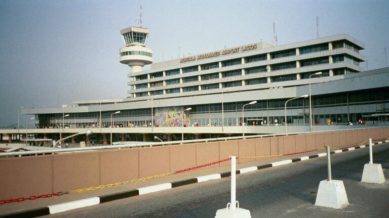National Issues
Rethinking the Proposed Airport Privatisation in Nigeria! Matters Arising – By Bolu Ojewole

It is ridiculous and shameful to hear that the ‘transformational’ agenda of the present administration of the airports now necessitates the push to selling the revamped and remodeled airports to private investors. ‘If government wishes to privatize the airports, why did it have to spend over N200 billion to remodel them and build cargo terminals?’ So they invested taxpayers’ funds (keeping in mind that the contracts have probably been over-inflated) to make the airport conducive and then turn around to say the Federal Airport Authority of Nigeria is incapable of running it at a profit. Last time I checked, Nigeria’s aviation tax, remains one of the highest in the world, and the service delivery at the airport remained shabby. This is the squander-mania we should all be worried about. I hear businesses say, Nigeria is a tough place to operate, I beg to differ, while we have several issues such as energy insufficiency, currency imbalance, multiple taxation, political instability, and insecurity to say the least. Nigeria however, has still remained a destination for investment, and as they say, operating in challenging markets does have its own benefits.
While I support privatization of public utilities and infrastructure for better service delivery and to reduce waste of government resources. Privatization ought to serve the greater public good, and not be a legally consistent way of wealth transfer to a few persons with access to capital or wealthy enough to influence government policy. The recent issues coming out of the privatization of PHCN assets leaves a lot to be desired. Government ought not to sell national assets for peanuts to cronies who in turn would use their leveraged position to grease the palm of public officials. This is sheer greed, and insensitivity on the part of the government. Well, as the response of our president goes, ‘stealing is not corruption’, I can understand maybe selling our national assets at give away prices is commendable and transformational as well. This form of wealth transfer is or may not qualify as stealing, but am sure the recent MALABU oil deal and the evidence in foreign courts presents a case study as to what leadership and corruption mean this days.
It is a worrying that our commonwealth is being handed over to individuals with briefcase companies just for profit purposes, with no concurrent social or economic value to the country and its people. Some will argue, that that privatization is the only way to go after commercialization failed us years back. In the final analysis, whatever policy it be called, as long as entrenched interest are the major players and benefactors of the process and the outcome, the people have and will continue to suffer hardship.
Government cannot continue to de-regulate, liberalize and privatize everything valuable without concurrent attention being paid to the need to avoid monopolistic market practices, or the present arrangement where businesses are granted concessions or right to operate or run essential services with no regards for the consumer rights. If they like, they should concession or privatize all the roads, ports, and airports to private entities; at least Lagos state has done that. However, there must be consequential responsibilities and duties in form of liabilities to those businesses now providing essential public services. In April 2014, the UK energy regulator, fined private energy companies supplying gas and electricity for failing to supply power to homes and businesses in many parts of Scotland. They were fined for their inability to restore power ‘quickly enough’ after storms disrupted power supply. This could qualify as an ‘act of God’ and or maybe a ‘force majeure’ could have been declared; but to do so in those circumstances is to be insensitive to the plight of customers who were left ‘power-less’ in the harsh winter condition. All companies complied and were comfortable with paying customers affected, with an apology for their failure to restore supply quickly. That is what regulators are there to do, and that’s how responsible companies react to operational disruptions or difficulty.
In the Nigerian, context, we for example has definitely failed to hold our telecom subscribers accountable to the customers. Imposing fines that do not trickle down to the customers or insufficiently harsh enough to force telecom companies to improve on services is the order of the day. This is what is already happening in already de-regulated and albeit privatized sector of telecoms. The customers are being ripped off and nobody has any idea of how to restore the supremacy of the customer. A few days back, a friend discussed the disparity in the actual value in the speed and megabytes in the data plans being sold by mobile networks in Nigeria. This is a long story for another day.
The Lekki Toll and the Lekkoyi Bridge Toll present an interesting case study on the importance of the government taking active interest in avoiding a situation where consumers are ripped off. Although, these legal contracts backing the constructions remain under public scrutiny. I can be said that using the bridge qualifies as a service. Therefore any accident caused on such roads by the ineffectiveness of provider is and should be actionable, since a service is being provided and paid for by road users. We cannot give out our public assets yet absolve the private companies of culpability for negligence. An accident on Lekki toll gate caused by a stray animal must lead to an indictment of the LCC, the same way we would hold MMA2 run by Bi-Courtney accountable should a data accident occur to passengers in their premises. A privatized Muritala Mohamed Airport should still not enjoy statutory protection reserved for public entities and companies, nor should the government pump in public funds to develop the airport for the investors to benefit from. Constructing another runway or improving on the existing structures and service, should be a major part of any deal should the privatization be a foregone conclusion as of today.
Privatization of the airports particularly raises serious national security implications in the light of the recent cash for arms scandal rocking Nigeria. Lets not forget the arms cache found at the Ports years back. Leaving private companies in full administration of the airports however economically justified, must be done with national security implications in mind. This is particularly important in the light of the ineffectiveness of the FAAN and other agencies at the airport to monitor and ensure compliance at the airport. Private Jets now fly out with undeclared cash, and we cam assume private jets fly in with a manners of items undeclared, un-vetted and untaxed. It can however be said, that maybe handing over airport to be run by business people for profit would allow the FAAN to focus on its core mandates. I rest my case on that, since the Nigerian government has never been short of solid arguments to back up its many policy summersaults.
A government that fails to comply with its own laws, does disservice to itself and undermines its own legitimacy. It is not enough to analyze issues without proffering solutions. We need strong institutions to safeguard our economy from exploitation. This requires a people centric government, which recognizes its role as the purveyor of what should constitute best practices in business. This it would do by reforming its own service delivery process, taking more active interest in reducing the time spent by citizens to access public services (obtaining drivers license, paying taxes, applying for permits should be faster), improving the quality of education, providing security for life and property, as well as encouraging businesses to thrive. As for encouraging businesses, it is not enough to create a conducive environment for businesses to profit, they should also be mandated comply with rules and regulations that serve the balanced interest of those who invest private capital and those who pay for the services rendered.
We already have evidence of privatized industries that are now money spinning ventures, either through the sheer ingenuity of the businessmen and women involved or through possibly the deliberate under-valuation of those companies. We need to approach the disposal of national asset with a sense of history as well as further recognize that these assets were funded by the taxes of the average Nigerian, and disposing them off should also balance the interest of the citizens, alongside the profit maximization objective of investors. The sad end to the failed privatization of the Ajaokuta Steel Mills with its assets being carted away highlights the need for government to not undervalue the assets in the first place. The ‘cherry pickers’ that oversaw the ‘asset ripping’ of Ajaokuta won’t have easily done so, had they paid close to actual value for the giant steel complex.
While my focus remains on the privatization of the airport. It is clear from facts, history and the trends noticeable that privatization would lead to increased cost on the customers, without an increased level of service delivery or regulatory control. Meanwhile, the cronies of the government and sometimes genuinely passionate businessmen are smiling to the banks. We cannot expect the companies to be fair. We must challenge our government to take a consumer-centric approach to its business policy, while also balancing the interest of the businesses and their roles within the economy. Regulatory intervention in liberalized or deregulated economy should only be to rectify ‘market failure’. The market has failed once there is a monopolistic market with anti-competitive conducts like price fixing, collusion, product tying occurring. These are the order of the day. Nigeria is a case study for the clear democratization of business monopoly often justified by the mantra of ‘Nigeria needs to support its best businesses to expand and aid national development’. It is arguable that there is any Nigerian company that gladly believes in being competitive or innovative in addressing the concerns of the customers.
It is high time we adopt a comprehensive Competition Policy backed by law and a regulator to monitor the activities of these successor companies who buy our assets at knockdown value. The Consumer Protection Council also needs to be re-energized with provisions for treble damages on companies infringing on the rights of paying customers, be it at the airport or in a simple purchase of goods. There is a need for effective and efficient enforcement of regulations across the nation in different sectors.
The government must also not approach privatization from the idea that it relieves government of ‘expenses’ alone, but while they have admitted failure in running public companies profitably, they must avoid selling national assets in a hurry or give-away prices. This however requires uncommon patriotism and accountability, which can be said to be lacking in the DNA of successive Nigerian governments. The short time before the next elections is not the perfect time to implement crucial policy changes in the aviation sector by way of privatization, considering the huge funds that have been expended in the last three years. However, should the privatization be deemed necessary, the reserve prices must reflect the ‘actual value’ of the airport, its buildings, surrounding properties and other assets. There should also be an efficient and responsive regulator in place to ensure consumers and users of the airport facilities are not subjected to unfair treatment and increase cost, which is not justified. Maybe this proposed privatization could usher in the era of genuine competition between airports in Nigeria for passengers, as well as also a reduction in the high taxes borne by the customers everyday. I will, like many interested Nigerians would continue to watch the unfolding policy direction keenly and see where this leads.
BOLU OJEWOLE LLB (Lagos) BL, LLM (London) is a Lagos based Business Lawyer, a former student congress executive at the University of Lagos. He holds pragmatic and consequentialist political leanings, he strongly advocates for socially responsible capitalism in Nigeria in an effectively regulated economy.





















